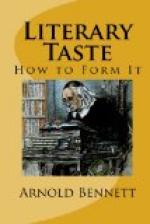ii. Works not originally written in English, such as the works of that very great philosopher Roger Bacon, of whom this isle ought to be prouder than it is. To this rule, however, I have been constrained to make a few exceptions. Sir Thomas More’s Utopia was written in Latin, but one does not easily conceive a library to be complete without it. And could one exclude Sir Isaac Newton’s Principia, the masterpiece of the greatest physicist that the world has ever seen? The law of gravity ought to have, and does have, a powerful sentimental interest for us.
iii. Translations from foreign literature into English.
Here, then, are the lists for the first period:
PROSE WRITERS L s. d.
Bede, Ecclesiastical History:
Temple
Classics.
0 1 6
Sir Thomas Malory, Morte d’Arthur:
Everyman’s
Library (4 vols.) 0 4 0
Sir Thomas More, Utopia: Scott Library 0 1 0
George Cavendish, Life of Cardinal
Wolsey:
New Universal Library. 0 1 0
Richard Hakluyt, Voyages:
Everyman’s
Library (8 vols.)
0 8 0
Richard Hooker, Ecclesiastical Polity:
Everyman’s
Library (2 vols.) 0 2 0
Francis Bacon, Works: Newnes’s
Thinpaper
Classics.
0 2 0
Thomas Dekker, Gull’s Horn-Book:
King’s
Classics.
0 1 6
Lord Herbert of Cherbury, Autobiography:
Scott Library.
0 1 0
John Selden, Table-Talk: New
Universal
Library.
0 1 0
Thomas Hobbes, Leviathan:
New Universal
Library.
0 1 0
James Howell, Familiar Letters:
Temple
Classics (3 vols.)
0 4 6
Sir Thomas Browne, Religio Medici,
etc.:
Everyman’s
Library. 0 1 0
Jeremy Taylor, Holy Living and Holy
Dying:
Temple Classics (3 vols.) 0 4 6
Izaak Walton, Compleat Angler:
Everyman’s
Library.
0 1 0
John Bunyan, Pilgrim’s Progress:
World’s
Classics. 0 1 0
Sir William Temple, Essay on Gardens
of Epicurus: King’s Classics.
0 1 6
John Evelyn, Diary: Everyman’s
Library (2 vols.)
0 2 0
Samuel Pepys, Diary:
Everyman’s
Library (2 vols.)
0 2 0
_________
L2
1 6




